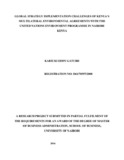| dc.contributor.author | Kariuki, Eddy G | |
| dc.date.accessioned | 2017-01-06T06:25:54Z | |
| dc.date.available | 2017-01-06T06:25:54Z | |
| dc.date.issued | 2016 | |
| dc.identifier.uri | http://hdl.handle.net/11295/99388 | |
| dc.description.abstract | Environmental management is of great importance globally. It has become a complex issue which requires long-lasting solutions. The major challenges facing nations globally include climate change and desertification. Several countries have collaborated with other partners in order to address these environmental problems by adopting the instruments of Multilateral Environmental Agreements (MEAs).The implementation of these agreements has been a great challenge to many nations, especially the developing countries. The study sought to establish global strategy implementation challenges of Kenya‟s Multilateral Environmental Agreements with the United Nations Environment Programme in Nairobi Kenya. A case study research design was adopted whereby the researcher interviewed five senior managers at United Nations Environment Programme who had different academic qualifications and years of experience in their positions. The data were collected through the use of an interview guide that was prepared to guide the researcher on the challenges affecting implementation of Kenya‟s Multilateral Environmental Agreements with the United Nations Environment Programme (UNEP) in Nairobi Kenya. Content analysis was used to analyze the data. The challenges that face Kenya in implementing Multilateral Environmental Agreements (MEAs) were highlighted to include limited resources, weak national level environmental governance system, ineffective coordination of institutions, and country characteristics that impact on the implementation process. Kenya was found to have entered into several international agreements and that there exists inadequate coordination between the agencies. This has caused the country to achieve less than optimal results where protection and strengthening of the existing conventions are concerned. The research recommends that UNEP should consider coming up with specific entry points for MEAs member countries such that a country level of development should determine its likelihood of compliance. Adequate financial resources should be dedicated to training and development of member countries‟ staff to equip them with necessary technical know-how for negotiating these agreements and implementation of the same. | en_US |
| dc.language.iso | en | en_US |
| dc.publisher | University of Nairobi | en_US |
| dc.rights | Attribution-NonCommercial-NoDerivs 3.0 United States | * |
| dc.rights.uri | http://creativecommons.org/licenses/by-nc-nd/3.0/us/ | * |
| dc.subject | Global Strategy Implementation | en_US |
| dc.title | Global Strategy Implementation Challenges of Kenya’s Multilateral Environmental Agreements With the United Nations Environment Programme in Nairobi Kenya | en_US |
| dc.type | Thesis | en_US |



